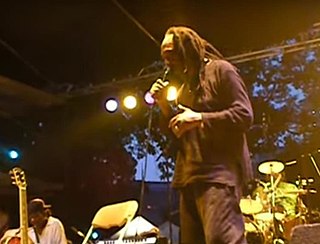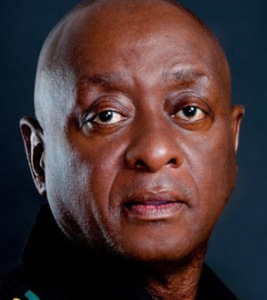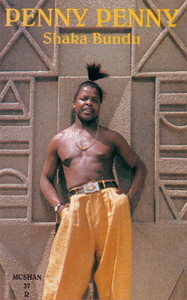Related Research Articles

Jonathan Paul Clegg, was a South African musician, singer-songwriter, dancer, anthropologist and anti-apartheid activist.

Zimbabwean music is heavily reliant on the use of instruments such as the mbira, Ngoma drums and hosho. Their music symbolizes much more than a simple rhythm, as the folk and pop style styled music was used as a symbol of hope for Zimbabweans looking to gain independence from Rhodesia. Music has played a significant role in the history of Zimbabwe, from a vital role in the traditional Bira ceremony used to call on ancestral spirits, to protest songs during the struggle for independence. The community in Zimbabwe used music to voice their resistance to their oppression, as one of the only weapons they had available to fight back with. In the eighties, the Music of Zimbabwe was at the center of the African Music scene thanks to genres such as Sungura and Jit. However, several performers were banned by state TV and radio leading to the closing of several music venues.

Thomas Tafirenyika Mapfumo is a musician nicknamed "The Lion of Zimbabwe" and "Mukanya" for his immense popularity and for the political influence he wields through his music, including his sharp criticism of the government of former Zimbabwean president Robert Mugabe. He both created and made popular Chimurenga music, and his slow-moving style and distinctive voice is instantly recognisable to Zimbabweans.

Neria is a Zimbabwean film made in 1991, written by the novelist Tsitsi Dangarembga. It is directed by Godwin Mawuru and the screenplay was written by Louise Riber. It is the highest-grossing film in Zimbabwean history.

Mbongeni Ngema was a South African playwright, lyricist, composer, director, choreographer, and theatre producer, best known for co-writing the 1981 play Woza Albert! and co-writing the 1988 musical Sarafina!. He was known for plays that reflected the spirit of black South Africans under apartheid, and won much praise for his work, but was also the subject of several controversies. He died in a car accident on 27 December 2023.

Oliver "Tuku" Mtukudzi was a Zimbabwean musician, businessman, philanthropist, human rights activist and UNICEF Goodwill Ambassador for Southern Africa Region.

Ricky Fataar is a South African musician who has performed as both a drummer and a guitarist. He gained fame as an actor in The Rutles: All You Need Is Cash, a spoof on the Beatles, in which he performed as a member of The Rutles. He was also a member of The Beach Boys between 1971 and 1974, and has been the drummer for Bonnie Raitt for the last 35 years. Fataar is also a record producer, and has worked on projects scoring music to film and television.
The Lobedu or Balobedu(also known as the BaLozwi or Bathobolo) are a southern African ethnic group that speak a Northern Sotho dialect. Their area is called Bolobedu. The name "balobedu" means "the mineral miners," lobela or go loba, - to mine. Their ancestors were part of the great Mapungubwe early civilization. They have their own kingdom, the Balobedu Kingdom, within the Limpopo Province of South Africa with a female ruler, the Rain Queen Modjadji.

Raymond Chikapa Enock Phiri was a South African jazz, fusion and mbaqanga musician born in Mpumalanga to Thabethe Phiri, a Malawian immigrant worker, and South African guitarist nicknamed "Just Now" Phiri. He was a founding member of the Cannibals in the 1970s. When the Cannibals disbanded Ray founded Stimela, with whom he conceived gold and platinum-selling albums like Fire, Passion and Ecstacy (1984), Look, Listen and Decide (1986). He collaborated with Paul Simon and Ladysmith Black Mambazo on Simon's Graceland (1986) album.
Mango Groove is an 11-piece South African Afropop band whose music fuses pop and township music—especially marabi and kwela.

Bolland & Bolland are two Dutch music producers and brothers, Rob Bolland and Ferdi Bolland. They were born in Port Elizabeth in South Africa.
Peta is a feminine given name. Notable individual with this name include:
Emma Goldrick was the pseudonym used by the married writing team formed by Emma Elizabeth Jean Sutcliffe and Robert N. Goldrick. Under this name they wrote 41 romance novels published by Mills & Boon between 1983 and 1996. After Robert's death, Emma wrote her last book, "The Ninety-Day Wife", in his memory.
Stimela, is a South African band which emerged as an afrofusion ensemble in the 1980s under the leadership of guitarist Ray Phiri best known for his collaboration on Paul Simon's Graceland and The Rhythm of the Saints, albums.
Aleksandar "Saša" Habić is a Serbian and former Yugoslav musician, record producer and composer. During his career as a producer he worked with artists like Piloti, Divlji Anđeli, U Škripcu, Jakarta, Beograd, Dorian Gray, Laki Pingvini, Bebi Dol, Željko Bebek, Luna, Laza Ristovski, Slomljena Stakla, Bajaga i Instruktori, Zana, Kornelije Kovač, Alisa, Dejan Cukić, Oktobar 1864, Rambo Amadeus, YU grupa, Galija, Nikola Čuturilo, Riblja Čorba, Kerber, Vampiri, Ruž, Regina, Van Gogh, Generacija 5, Familija, Smak, Zdravko Čolić, Dragoljub Đuričić, Cactus Jack, and others.

Shaka Bundu is the debut album by South African musician Penny Penny released in 1994. Penny was discovered in a Johannesburg recording studio by producer Joe Shirimani, who was impressed by Penny's unique vocal style. Shirimani's record label Shandel Music let the pair record an album together. Recorded over the space of one week using an Atari computer, Korg M1 synthesiser and reel-to-reel tape, the album blends the Tsonga disco style of music with American house music, reflecting the popularity of American and British electronic dance music in South Africa. It has been credited for pioneering a new style of Tsonga disco with its fusion of slow house rhythms, synthesised steel drums and Penny's modern vocal style atop traditional call-and-response female backing vocals.
Eric Kulani Giyani Nkovani, better known by his stage names Penny Penny and Papa Penny is a South African musician and politician, known affectionately as the "Shangaan Disco King" for the musical style he helped popularise.
Khutso Steven Kgatle, better known by his stage name King Monada, is a South African singer, songwriter, and record producer. He rose to fame after the release of his 2016 single "Ska Bhora Moreki" and "Malwedhe" (2018), which peaked #9 iTunes Chart and #54 Apple Music Chart. He is known for singing in the Khelobedu language, which are local dialects of Northern Sotho.
Candy Tsa MandebeleMokwena is a South African singer, songwriter, actress. Born and raised in Limpopo, she began singing in her mother's community traditional group, Sekgapa, at the age of 14. Mandebele began her career in 1993 as a songwriter, prior to joining group Shaka Bundu Girls in 1995.
Kgaogelo Moagi, known professionally as Master KG, is a South African musician and record producer. Born and raised in Tzaneen, his debut studio album Skeleton Move achieved acclaim including an AFRIMA Award for Best Artist/Group in the African Electro category. He is also known as the pioneer of "Bolobedu" dance.
References
- ↑ Harris, Craig. "Peta Teanet: Biography". Allmusic. Retrieved 9 January 2011.
- ↑ https://tzaneenvoice.co.za/plans-to-commemorate-the-disco-legend-peta-teanet-with-music-festivals-in-place/
- ↑ "Peter Teanet's sons Richie and C Boy honour his legacy 26 years after his death". iol.co.za. 11 July 2022. Retrieved 15 June 2023.